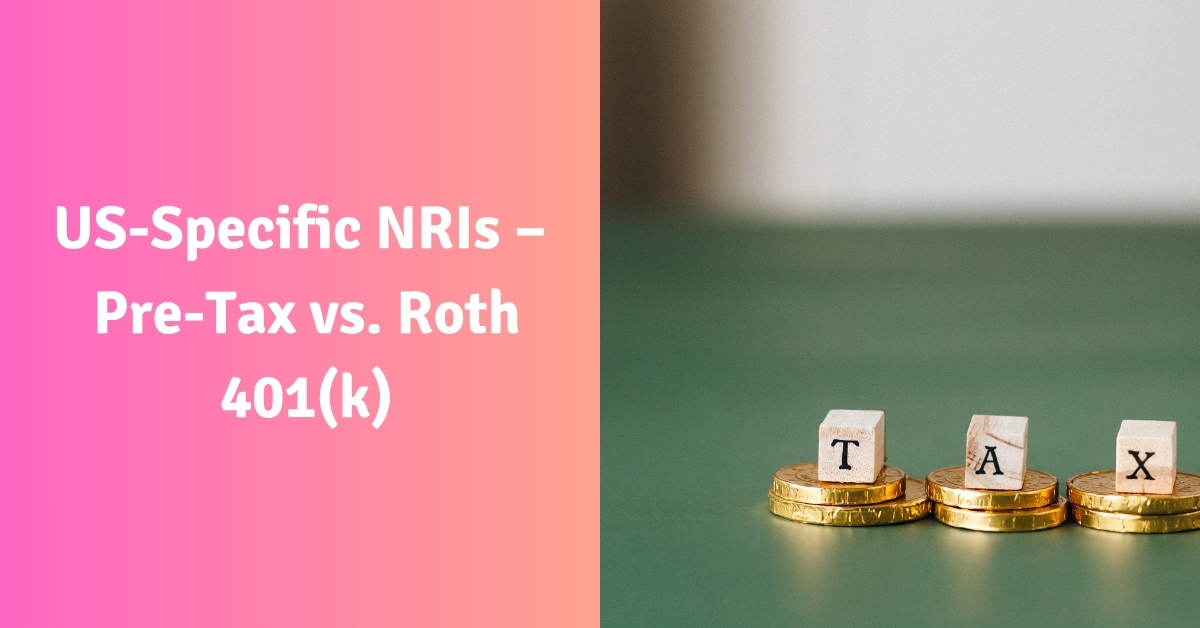US-Specific NRIs – Pre-Tax vs. Roth 401(k)

It is challenging to navigate financial choices as an NRI in the US, particularly for retirement savings. A question that plagues most NRIs is whether to go for pre-tax or Roth 401(k) contributions. It can have a profound effect on your financial life, so it’s important to know the distinctions and how each of them could be advantageous to you.
Pre-Tax 401(k) vs. Roth 401(k) Explained
A pre-tax 401(k) allows you to add to your retirement account before taxes are withheld. This reduces your taxable income in the year and therefore your up-front tax cost. For example, if you earn $150,000 a year and add 10% ($15,000) to a pre-tax 401(k), your taxable income would decrease to $135,000, saving you roughly $3,600 if you’re taxed at the 24% rate.
On the other hand, a Roth 401(k) involves investing with after-tax dollars, so you’ll pay tax on your total income all at once. But the good news is that when you take out the money in retirement, as well as any investment gains, you won’t have to pay taxes.
What’s Best for NRIs?
The pre-tax or Roth 401(k) decision is strongly dependent on what you are going to do in the future, especially if you are going to stay in the US or go back to India.
- If You Are Going Back to India: Pre-tax contribution can be a more suitable option if you are going to go back to India after staying and working in the US. You are lowering your taxable income here in the US through pre-tax contributions. Later, when you withdraw the money in retirement, you can potentially use tax treaties between India and the US to minimize tax impact. This option is more tax-planning flexible, so it is popular among NRIs who plan to stay back in the US.
- If You Plan to Stay in the US: If you wish to remain long-term in the US, you might be inclined towards contributions to Roth 401(k) accounts. Under Roth accounts, you get tax-free distributions in retirement, which can be a huge advantage if tax rates rise in the future. In addition to this, you would not be bothered by Required Minimum Distributions (RMDs) for Roth accounts, so that you can easily manage your capital and even donate tax-free to your children.
A Hybrid Strategy
The majority of NRIs prefer a combination scheme, contributing to both pre-tax and Roth 401(k) schemes. The strategy is beneficial since you have the flexibility to enjoy tax savings now as well as tax-free withdrawals at retirement. It is a smart way of hedging your bet, so that you are prepared to tackle different financial scenarios.
Contribution Limits for 2025
For 2025, your contribution limit is $23,500 in 401(k). In case you are 50+, you have a catch-up addition of $7,500. You have an option to contribute to both pre-tax and Roth accounts in ratio with your finance goals and taxation strategy.
Critical Points for NRIs
As you make decisions between pre-tax and Roth 401(k), consider the following:
- Your Plans for the Future: Do you plan on returning to India or staying in the US?
- Tax Brackets: Will you be taxed at a lower or higher tax rate in retirement?
- Flexibility: How much do tax-free withdrawals in retirement matter to your financial health? Remember, it’s not just about the math – it’s about your plans for your life and what will give you the most sense of security in the future.
If you are still in doubt, it’s always better to seek the experts’ advice. Each person’s financial situation is unique, and an expert will advise you to make the most suitable choice for your situation.
FAQs:
- What is a 401(k)?
Ans- A 401(k) is a retirement savings plan sponsored by an employer, whereby employees can contribute a fraction of their salaries to long-term investment accounts. - What’s the difference between pre-tax and Roth 401(k)?
Ans- Pre-tax 401(k) contributions are made before the taxes are deducted, reducing your immediate taxable income. Contributions to Roth 401(k) are made after taxes but withdrawals during retirement are tax-free. - Are NRIs who work in the US eligible to contribute to a 401(k)?
Ans- Yes, NRIs who work in the US can contribute to a 401(k) as US citizens can. - Should NRIs go for pre-tax or Roth 401(k)?
Ans- It depends on your long-term plans. Pre-tax could be better if you plan to return to India, while Roth could be better if you plan to stay in the US. - What are 2025 401(k) contribution limits?
Ans- The limit is $23,500, with an additional $7,500 of catch-up contributions for individuals age 50 and above. - What is the tax benefit of a pre-tax 401(k)?
Ans- Contributing to a pre-tax 401(k) lowers your taxable income, which means you save taxes in the short run. - Are Roth 401(k) account withdrawals tax-free?
Ans- Yes, retirement withdrawals from Roth 401(k) accounts, including investment gains, are tax-free. - Can I split my contributions between Roth and pre-tax 401(k)?
Ans- Yes, you can contribute to pre-tax and Roth 401(k) accounts, depending on your goals. - Do I have to pay taxes on 401(k) withdrawals in India?
Ans- If you return to India, US-India tax treaties can assist you in minimizing tax on 401(k) withdrawals.
Disclaimer: The information provided here is for educational and informational purposes only and should not be construed as financial, legal, or tax advice. Consult with a qualified professional before making any investment decisions. We do not accept any liability for errors or omissions in this information nor any direct, indirect, or consequential losses arising from its use.



